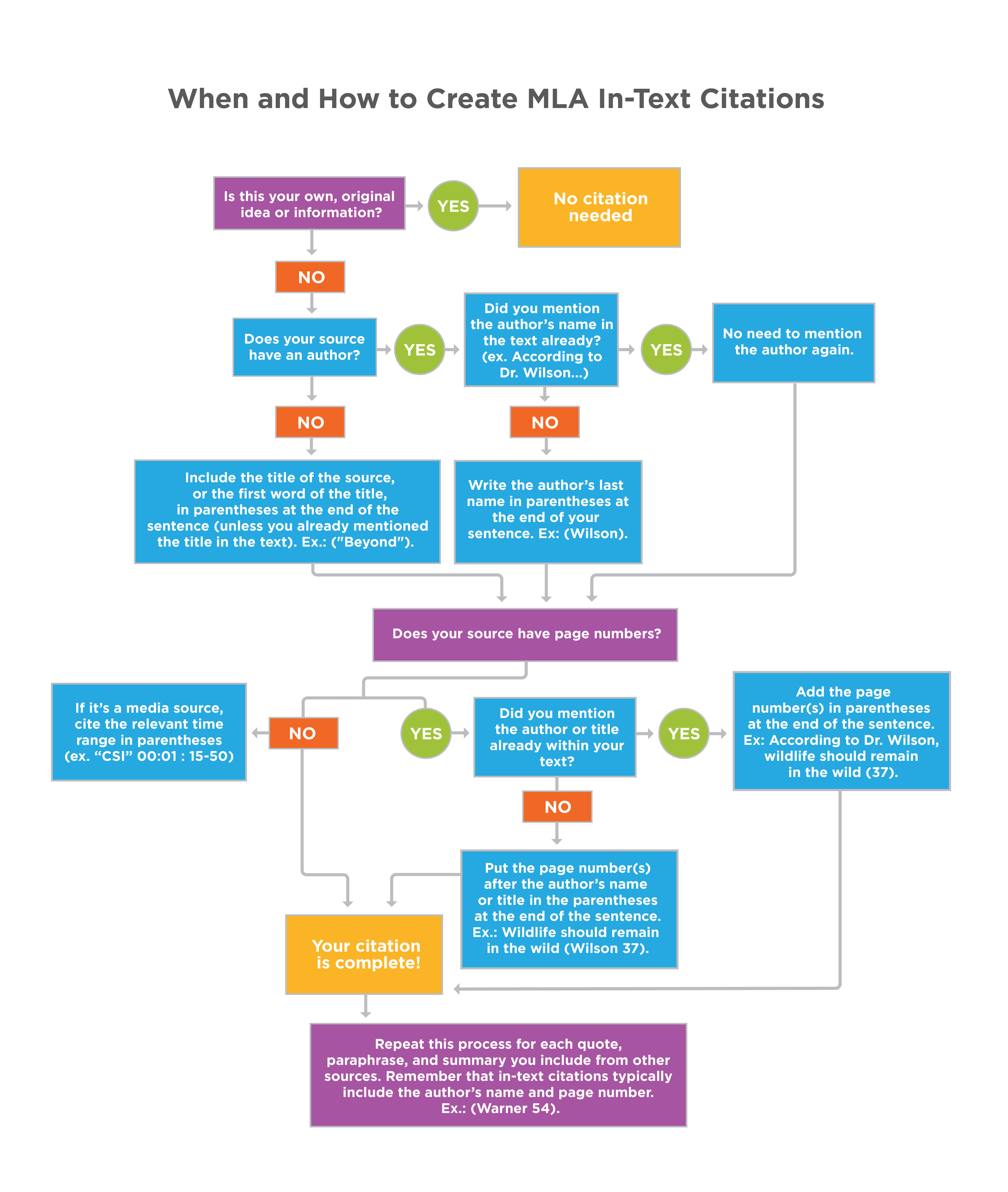In-text citations are brief indicators of the source information you’ve used within the text of your writing. They usually contain just enough information (author’s last name) to find the fuller citation at the end of the text.
Because the use of in-text citations will be so integral to your writing processes, being able to craft correct citations will save you time during writing and revising.
Below is the standard correct in-text citation style according to MLA guidelines:
Take a moment to carefully consider the placement of the parts and punctuation of this in-text citation. Note that there is no punctuation indicating the end of a sentence inside of the quotation marks—closing punctuation should instead follow the parentheses. There is also no punctuation between the author’s last name and the page number inside of the parentheses.

Include the right information in the in-text citation. Every time you reference material in your paper, you must tell the reader the name of the author whose information you are citing. You must include a page number that tells the reader where, in the source, they can find this information. The most basic structure for an in-text citation looks like this: (Smith 123).
So, let’s say we have the following quote, which comes from page 100 of Elizabeth Gaskell’s North and South: “Margaret had never spoken of Helstone since she left it.” Gaskell, Elizabeth. North and South. Oxford University Press, 1973.
The following examples show incorrect MLA formatting:
| “Margaret had never spoken of Helstone since she left it.” (Gaskell 100) | Incorrect because the period falls within the quotation marks |
| “Margaret had never spoken of Helstone since she left it” (Gaskell, 100). | Incorrect because of the comma separating the author’s last name and the page number |
| “Margaret had never spoken of Helstone since she left it” (Elizabeth Gaskell 100). | Incorrect because the author’s full name is used instead of just her last name |
| “Margaret had never spoken of Helstone since she left it” (North and South 100). | Incorrect because the title of the work appears, rather than the author’s last name; the title should only be used if no author name is provided |
The following example shows correct MLA formatting:
However, there are exceptions to the above citation guideline. Consider the following format of an in-text citation, which is also formed correctly.
Elizabeth Gaskell’s narrator makes it clear that “Margaret had never spoken of Helstone since she left it” (100).
If the author’s name is included before the quotation, you only need to put the page number into the parentheses at the end.
The same rule about inclusion of the author’s last name applies for paraphrased information, as well, as shown in the following example:
Basic Rule:
Your reader needs to know where the information from the source starts and ends, and from what source the information is taken.

Here are additional examples, both correct (green checkmark) and incorrect (red X).

In-text citations are often parenthetical, meaning you add information to the end of a sentence in parentheses. But if you include that necessary information in the language of the sentence itself, you should not include the parenthetical citation. This example shows you proper uses of in-text citations.
Review in-text citations by viewing the following video.
Candela Citations
- MLA In-Text Citations. Revision and adaptation (slightly edited) of the page MLA In-Text Citations at https://courses.lumenlearning.com/wm-englishcomposition1/chapter/text-mla-in-text-citations/ which is a revision and adaptation of sources listed below. Authored by: Susan Oaks. Provided by: Empire State College, SUNY OER Services. Project: College Writing. License: CC BY-NC-SA: Attribution-NonCommercial-ShareAlike
- MLA In-Text Citations. Provided by: Lumen Learning. Located at: https://courses.lumenlearning.com/suny-esc-wm-englishcomposition1/wp-admin/post.php?post=450&action=edit. Project: English Composition I. License: CC BY-SA: Attribution-ShareAlike
- Formatting In-text Citations (MLA). Authored by: Jennifer Yirinec and Lauren Cutlip. Located at: http://writingcommons.org/open-text/writing-processes/format/mla-format/444-formatting-in-text-citations-mla. Project: Writing Commons. License: CC BY-NC-ND: Attribution-NonCommercial-NoDerivatives
- Images and text from How to Cite an Essay. Provided by: WikiHow. Located at: http://www.wikihow.com/Cite-an-Essay. License: CC BY-NC-SA: Attribution-NonCommercial-ShareAlike
- In-Text Citations in MLA 8th Edition. Authored by: EasyBib. Located at: http://www.easybib.com/guides/citation-guides/mla-8/in-text-citations/. License: CC BY-NC-SA: Attribution-NonCommercial-ShareAlike
- MLA In-text citation graphic. Authored by: Kim Louie for Lumen Learning. License: CC BY: Attribution
- MLA: Block Quotations. Authored by: Catherine McCarthy. Provided by: Boundless. Located at: https://www.boundless.com/writing/textbooks/boundless-writing-textbook/writing-a-paper-in-mla-style-humanities-255/mla-structure-and-formatting-of-specific-elements-302/mla-block-quotations-310-16896/. Project: Boundless Writing. License: CC BY-NC-SA: Attribution-NonCommercial-ShareAlike
- video MLA In-Text Citations (9th edition). Provided by: Greenley Library, SUNY Farmingdale State College. Located at: https://www.youtube.com/watch?v=NJpgJa8MQ0Q. License: Other. License Terms: Standard YouTube License